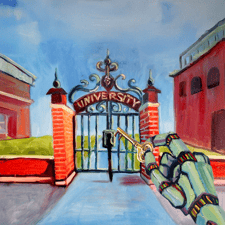Noble and Pragmatic Reasons to Embrace Generative AI
Yes, the chatbots may undermine your power. That’s a good thing.
By Luis Lozano Paredes
Illustration by Chris Dreger (used with permission).
Higher education should not be about imposing one mode of thought but fostering the ability to critically engage with multiple perspectives. And plenty of academics do agree, at least in word, that instead of teaching students what to think, universities should focus on teaching how to think. Yet many reject Generative Artificial Intelligence when GenAI tools have the power to help us do just that.
The rise of GenAI in higher education has triggered fierce debates. Skeptics warn of risks to academic integrity, environmental sustainability, and scholarly values, fearing erosion of the cognitive capacity of students and faculty alike. While these concerns are not entirely invalid, I believe that much of the opposition stems from deeper anxieties about power — specifically, faculty fears over losing control of knowledge production, evaluation, and dissemination.
At least until our current model, universities have historically served as bastions of credentialism, where knowledge is tightly controlled, and access to learning therein remains a privilege rather than a right. GenAI challenges this structure by making research tools and advanced writing capabilities more accessible to students, independent scholars, and others outside elite academic circles.
Perhaps unsurprisingly, rather than embracing GenAI as a means to help with hypothesis generation, knowledge production, expansion of access, and learning, some scholars view it as a disruptive force that threatens their authority. But this defensive, gatekeeping posture risks undermining the university’s broader mission to democratize knowledge and empower students.
These applications do not replace human educators but redistribute cognitive labor in ways that can free up faculty to focus on deeper engagement, discussion, mentorship, and academic discussion.
Critics argue GenAI will “deskill” students and researchers by making intellectual labor too easy. Some warn AI “flattens the creative process,” enabling output without struggle. Such arguments mirror historical anxieties about technological shifts, from the printing press to the internet and even the calculator, all of which were accused of diluting expertise.
Despite the fears, in reality GenAI provides enormous benefits for students who may be otherwise marginalized through circumstance. For example, AI-powered research assistants can help neurodivergent students, international students facing language barriers, and those with limited academic training navigate complex writing and research processes. Opposing these tools on the grounds of “preserving academic integrity” reveals an implicit bias toward maintaining an exclusive intellectual club rather than expanding access to learning.
Research about how socio-economic background shapes academia highlights how academia remains largely inaccessible to those from lower socioeconomic backgrounds. If universities and other higher education institutions are serious about expanding access, banning AI that makes academic work more accessible contradicts their stated goals.

Some opponents of GenAI in education worry about homogenization, arguing that AI-generated text could erode originality in knowledge production. While this concern is worth considering, it assumes that AI is being used to replace rather than enhance learning.
In practice, well-designed AI tools can help students learn to compose ideas and words through an iterative process of production. They can scaffold student engagement, providing structure for those who struggle with argumentation or organization. Different AI tools can be integrated to support distinct pedagogical goals, allowing for more thoughtful engagement with learning. AI adaptive tutors can provide personalized instruction for advanced and struggling students alike, and GenAI language model-based research assistants can help democratize academic inquiry.
These applications do not replace human educators but redistribute cognitive labor in ways that can free up faculty to focus on deeper engagement, discussion, mentorship, and academic discussion.
What about critics’ concerns regarding AI’s corporate ownership and bias in training data? These concerns are not unfounded, but they are also not unique to AI; biases and structural inequalities have long shaped academic production. As Audrey Tang notes, the real problem here is not AI per se but the concentration of technological power in the hands of a few corporate entities both public and private. Rather than rejecting GenAI, academics could be advocating for open-access models that align with the core principles of inquiry, transparency, and academic freedom.
Rather than rejecting GenAI, academics could be advocating for open-access models that align with the core principles of inquiry, transparency, and academic freedom.
The rise of GenAI does force academia to confront whether text — journal articles, monographs, and conference papers — should remain the primary mode of scholarly communication, as it raises questions about whether textual production should be the central thing assessed for merit.
But let’s be clear: The rise of AI does not spell the end of scholarly rigor but rather an opportunity for academia to evolve its standards. We are already seeing a (re)turn to oral and embodied forms of knowledge — academic podcasts, live-streamed debates, interactive research platforms. AI is accelerating this transition by enabling real-time knowledge synthesis and interactive engagement.
Rather than resisting change, universities and academics should ask themselves: Are we adapting or simply protecting the past? If academia is to remain a space of intellectual dynamism concerned with human flourishing, it must and needs to embrace GenAI. And this will require a power shift — from knowledge gatekeeping to knowledge facilitation, from exclusivity to inclusion, from rigid hierarchies to adaptive, student-centred learning. The benefits are too great to leave at the university gates.
Disclosure: Generative AI was used to improve the legibility and streamline the English language quality of the original draft of this article.
